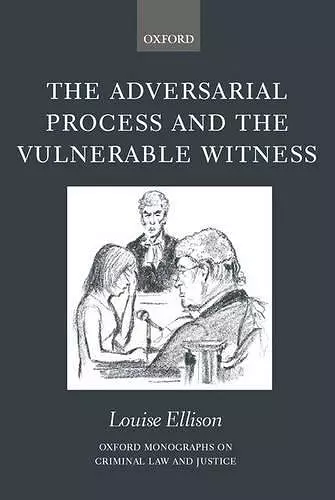The Adversarial Process and the Vulnerable Witness
Format:Hardback
Publisher:Oxford University Press
Published:10th Jan '02
Currently unavailable, and unfortunately no date known when it will be back

Until quite recently it was commonplace to describe the witness as the 'forgotten man' in the criminal justice system. The last few years have seen a dramatic shift in thinking with an increasing recognition of the legitimate expectations and rights of witnesses within the criminal process. At the same time research has drawn attention to a host of factors that conspire to deny the courts access to the best evidence potentially available when so-called vulnerable and intimidated witnesses are called upon to testify in accordance with conventional adversarial trial procedures and methods. The official response so far embodies an approach best described as one of accommodation. Efforts have centred on improving the treatment of witnesses within the established trial framework while preserving an overall commitment to key tenets of adversarial theory. The latter include the principle of orality with its general insistence upon direct evidence and the use of cross-examination as a device for testing the credibility of witnesses. The central contribution of this book lies in its demonstration of the significant limitations of the prevailing approach, most recently manifest in the Youth Justice and Criminal Evidence Act 1999. By providing a broader theoretical framework for understanding the treatment of vulnerable witnesses it signals the need to extend the search for solutions beyond the boundaries of the paradigmatic adversarial model. Drawing upon modern psychological, socio-linguistic, and victimological study across common law jurisdictions, the book provides a systematic critique of the special measures of the 1999 Act and of adversarial trial procedure more generally. As a point of contrast the book also explores the contended advantages inherent within inquisitorial style criminal proceedings for witnesses, drawing on the author's own experience of rape proceedings in the Netherlands. Throughout due account is taken of significant recent developments at national, European, and international levels which have ensured the place victims and witnesses, once excluded, in any discussion of criminal trial fairness.
Louise Ellison has provided a much needed and ground-breaking overview of the treatment of vulnerable witnesses in the adversarial process ... her work offers a lucid and concise analysis of all relevant issues ... The introductory chapter provides a very solid, up-to-date background on the emergence of the victim on the international criminal justice agenda ... a fruitful analysis ... a well-crafted scholarly contribution to the ongoing public debate in the field, and should be of interest to practitioners, academics and students alike. * British Journal of Criminology *
... Ellison has made a valuable contribution to an increasingly topical field of criminal justice policy-making and criminal procedure law. * The International Journal of Evidence & Proof *
Ellison brings together an impressive body of research findings .... The Adversarial Process and the Vulnerable Witness is a valuable book which takes the debate about the treatment of vulnerable and intimidated witnesses in traditional English criminal proceedings several steps forward ... the book clearly points criminal justice scholars in the right direction when seeking alternative approaches to the difficulties faced by vulnerable and intimidated witnesses. * Modern Law Review, January 2003 *
ISBN: 9780198299097
Dimensions: 241mm x 162mm x 20mm
Weight: 458g
200 pages